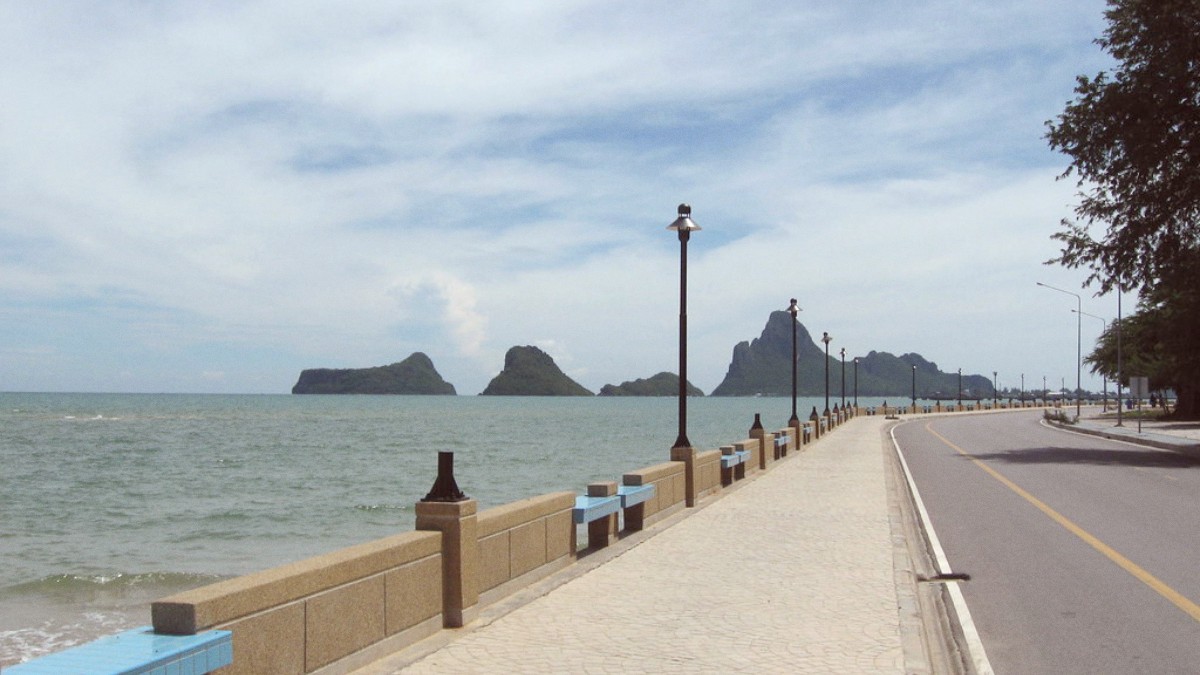
Upper Southern Gulf, Thailand
The province experiences a tropical savanna climate, with three distinct seasons. Each brings an unique experience, influencing crowd levels, prices, and available activities.
Climate patterns throughout the year: The Cool and Dry Season (November to February) brings the most comfortable weather, with pleasant temperatures (20°C-30°C) and minimal rainfall. The Hot Season (March to May) sees temperatures rising, often exceeding 35°C, with high humidity. The Rainy Season (June to October) brings higher humidity and more frequent rain showers (25°C-32°C), though less severe than Thailand's Andaman coast.
For beach and water sports, November to February offers perfect conditions with calm seas. Hiking and nature exploration in national parks are also best during this cool season for comfortable temperatures. Cultural sightseeing and night markets can be enjoyed year-round, with the cool season offering the most comfort for evening strolls.
When traveling during the hot or rainy seasons, plan your outdoor activities for early mornings or late afternoons to avoid the most intense heat or potential rain.
November to February
Best weather: cool, dry, sunny. Ideal for all outdoor activities and water sports.
Higher prices for accommodation and flights. Larger crowds at popular attractions.
March to May & July to October
Fewer crowds and lower prices. Lush landscapes during rainy periods. Showers often pass quickly.
March-May can be uncomfortably hot. July-Oct brings higher humidity and possible rain, possibly affecting outdoor plans.
June to October
Lowest prices for flights and accommodation. Most peaceful and authentic experience with fewer tourists.
Higher chance of rain, limiting some outdoor activities. High humidity. Some smaller businesses may have reduced schedules.
Requirements vary by nationality. Checking the latest regulations well in advance of your travel date is always a good idea. Citizens of many countries (US, UK, Canada, Australia, most EU) receive a 30-day visa exemption upon air arrival (15 days by land). This 30-day exemption can often be extended for an additional 30 days at an immigration office. Citizens of certain countries (India, China) can apply for a 15-day Visa on Arrival (VOA) at designated international airports. For longer stays, a 60-day Tourist Visa can be obtained from a Thai embassy in your home country before travel, often extendable for another 30 days.
Your passport must be valid for at least six months beyond your planned departure. You may need proof of a confirmed onward or return ticket. Sufficient funds to support your stay (around 10,000 THB per person) can be requested. Carry a few recent passport-sized photos for applications or extensions. Accommodation proof is sometimes requested. Thailand has removed specific mandatory health-related entry requirements, but always check official sources.
Minimum six months beyond departure.
Proof of confirmed exit ticket may be checked.
Around 10,000 THB per person can be requested.
Carry passport-sized photos for visa/extensions.
No general entry fees for visa-exempt travelers. Visa fees apply for Tourist Visas or VOAs.
Costs vary significantly based on your travel style, from backpacking to luxury.
The local currency is the Thai Baht (THB). Exchange major currencies at banks, exchange booths (better rates), or some hotels. ATMs are widely available, but note the common 220 THB foreign transaction fee per withdrawal from Thai banks.
Tipping is not mandatory but is appreciated for good service. Upscale restaurants may include a 10% service charge. For others, rounding up or leaving 20-50 THB ($0.50-$1.50 USD) is common. For taxis/songthaews, round up. For hotel staff, 20-50 THB. For massage therapists, 50-100 THB or more for excellent service.
While Thailand is generally safe for travelers, understanding common concerns and preventive measures is wise.
Yellow Fever is required only if arriving from a risk country. Recommended: Hepatitis A, B, Typhoid, Rabies (if interacting with animals/rural areas). Consult a healthcare professional 4-6 weeks prior to travel.
Drink sealed bottled water, avoid non-filtered ice. Eat hot, freshly cooked food. Wash hands often. Carry an Over-the-counter anti-diarrhea medication like Imodium.
Use Insect repellent with DEET/Picaridin, especially at dawn/dusk. Wear long sleeves/pants. Consider Permethrin-treated clothing.
Temperatures can be high. Hydration and sun protection are .
Stay hydrated with plenty of bottled water. Wear light, breathable clothing. Seek shade during the hottest parts of the day. Avoid strenuous activity during midday. The sun's intensity is high.
Use High SPF reef-safe sunscreen, even on cloudy days. Wear a Wide-brimmed hat and Sunglasses. Reapply sunscreen frequently, particularly after swimming.
Heatstroke/Dehydration are preventable with careful planning.
Prachuap Khiri Khan offers good healthcare, specifically in Hua Hin. Bangkok Hospital Hua Hin and San Paolo Hospital Hua Hin are modern private hospitals with English-speaking staff. Pharmacies are common and well-stocked.
Tap water is generally not safe for drinking. Always choose sealed bottled water, widely available and inexpensive. Consider a LifeStraw Go water filter bottle for emergencies or to reduce plastic waste.
Eat at busy street food stalls and restaurants; high customer turnover means fresh ingredients. Observe vendor cleanliness. Peel fruits yourself. Avoid raw vegetables potentially washed in tap water.
Prachuap Khiri Khan is generally safe for tourists. Violent crime against tourists is rare, but awareness of common concerns is prudent.
These resources contribute to a safer travel experience in Thailand.
Adventure Medical Kits for comprehensive first aid supplies tailored for travelers.
Pacsafe for anti-theft bags and travel security products to protect your valuables.
Airalo for international eSIMs to stay connected without physical SIM cards.